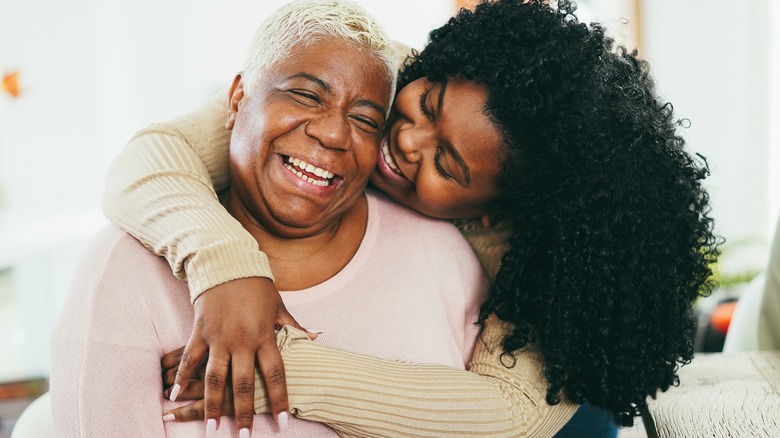How To Get Your Loved Ones To Take Your Anxiety Seriously When They Just Don't Understand
Anxiety is one of the most common forms of mental illness. It affects roughly 30% of people at least once in their lifetime and occurs twice as often in women. Those who have never dealt with it first-hand have a hard time not just understanding anxiety, but taking it seriously. Even when our loved ones witness the physical symptoms that come with an anxiety attack — like sweating, trembling, and shortness of breath — some continue to dismiss it. They may chalk it up to normal stress or even just being dramatic. But the reality is that anxiety disorders can be debilitating if they're not treated.
"Anxiety is so expansive, it affects the entire system," the author of "Monkey Mind: A Memoir of Anxiety," Daniel Smith tells NPR. "It affects you physiologically, it affects you cognitively, it affects you emotionally. It's a real holistic — not to put too nice and calm a word on it — emotion."
Do you suffer from anxiety and you feel like you're losing your fight to make your family and friends understand your struggle? Then, it's time to sit down and have a serious talk. Suffering in silence amongst people who don't get it, can make anxiety even more difficult to navigate.
Address your anxiety when you're in a calm mental space
As someone who lives with anxiety, you already know that when your anxiety is heightened it's never the ideal time to try to do anything that requires calm and collected thoughts. That's why it's essential to wait until your anxiety levels are low before talking to your loved ones about the effects of anxiety and the panic attacks that sometimes accompany it.
If you are prone to panic attacks, you know how they can affect you intensely and often without warning. These attacks come on abruptly and suddenly you're swimming in fear. These can be physically crippling as those having the attack struggle with nausea, sweating, shortness of breath, shaking, increased heart rate, or heart palpitations. This can all make having a clear and effective conversation with loved ones impossible and the stress could make symptoms worse. So, wait until you've completely recovered from a panic attack and can communicate with clarity to discuss your anxiety.
Sufferers of generalized anxiety may not always suffer from panic attacks. However, those dealing with it know that their anxiety levels can vary greatly from day to day and even over just a few hours. When brooching the subject with loved ones, be diligent about finding a time when your anxiety is at a low level. This will give you the calmness and composure to find the best ways to describe your feelings and emotions.
Let them ask questions
Even if you're not a trained expert on the subject of anxiety, you can still field questions from your loved ones about what you know, what you experience, how it affects you, and the steps you're taking (or plan to take) to manage it. Be patient with your family, no matter how obvious you feel their questions might be. Remember, you want to make them understand so they will be there to help, mentally, emotionally, and physically when you need it. Building a supportive network of people who are there for you can be just as important as seeking professional and medicinal treatment.
A question that's likely to come up is "why?" If you had a picture-perfect childhood, free of trauma, your parents may wonder what they could have done differently or why you might be the only child in the family who has anxiety. Although some mental illnesses come with a definitive answer to that question, anxiety isn't one of them. Anxiety is often the result of two possible factors: genetics and environment. Some families are rife with anxiety, even if it skips a generation or two. And environmental causes like a childhood illness or the death of a loved one at a vulnerable time can also contribute to anxiety disorders.
Lean on other resources
Whether you're already in therapy or about to start, giving your loved ones the opportunity to join you for a session may provide them insight that you can't. Many have come a long way in destigmatizing mental illnesses, but it doesn't mean your family and friends have joined the club. A psychologist, psychiatrist, or therapist can explain to your loved ones that anxiety isn't just stress. It's not all in your head, and while there are varying degrees of it, it's a real mental illness. It needs to be recognized by them to help you manage your symptoms and keep your head above water.
However, if therapy is out of your reach, there are other ways to give your loved ones an intimate look into what living with anxiety is like. For example, journaling about your anxiety, then sharing it with them. Not only is journaling deeply therapeutic, but it helps people accept their mental experiences in a healthier light. Plus, when you share those written thoughts, they'll likely come out in a more understandable way than if you wing the conversation.
Think about the outlooks of your loved ones when looking for other resources to help you explain your anxiety. Are they concrete, fact-driven thinkers? Use printouts from online medical resources or published studies about anxiety to help them understand. If they're more emotional thinkers, watching YouTube videos or movies about characters suffering from anxiety disorders can help give them more insight.



